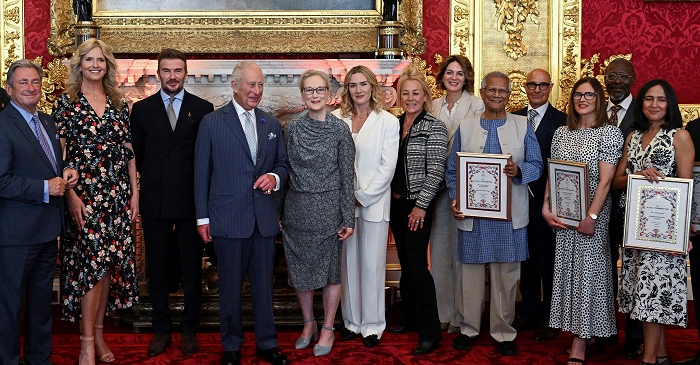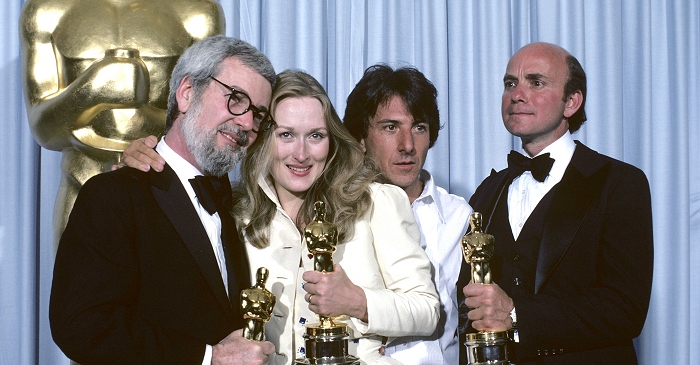|
Simply Streep is your premiere online resource on Meryl Streep's work on film, television and in the theatre - a career that has won her acclaim to be one of the world's greatest living actresses. Created in 1999, Simply Streep has built an extensive collection over the past 25 years to discover Miss Streep's body of work through thousands of photographs, articles and video clips. Enjoy your stay and check back soon.
|
|
Streep 'freaked out' by stardom
The Los Angeles Times ·
September 19, 1981
· Written by Peter J. Boyer
|
When the workday ended Friday, Aug. 27, without the occurrence of a major news event, the marketing corps at United Artists breathed a collective sigh of relief. They had their cover of Time magazine. “You never know about those things,” said Eddie Kalish, UA marketing vice president. “There could have been a bomb go off in some embassy somewhere and knocked us off the cover.” They knew that Meryl Streep was in. The Time cover portrait featuring Streep hit newsstands around the world Aug. 30. “I am freaked out by what being a celebrity is about. It’s like a mantle that just sort of came down and was visited upon m e . . . It has no relation to me, no relation to what I do or who I am,” Streep said later as she sat in a chic little cafe in Manhattan’s SoHo section. During the two-hour interview, the topic frequently turned to her burgeoning public persona, and her sense of a loss of control. “I feel like I have a responsibility to a career that’s really taken off without my knowing it, do you know what I mean?” So, in the three weeks between the Time cover and the release of her latest movie, The French Lieutenant’s Woman, Streep agreed to meet with nearly three dozen reporters.
High hopes
Streep, 32, is the most marketable element of French Lieutenant’s Woman, the film version of John Fowles’ novel on which UA has pinned high hopes to counter the reverberations still emanating from its Heaven’s Gate disaster. That experience could be washed clean if French Lieutenant’s Woman even comes close to fulfilling expectations. But first things first. French Lieutenant’s Woman has to be sold to moviegoers. And the film presents certain marketing difficulties. In his novel, Fowles meshed his Victorian passion tale with frequent observations from the story’s 20th-century narrator. The narrator’s interruptions are, according to many who abandoned attempts to adapt the novel to film, quite necessary. Screenwriter Harold Pinter and director Karel Reisz decided to make a multilayered movie, without a narrator but using a film-within-a-film technique. Such a movie is not handily peddled. So, UA decided on a “platform” strategy for French Lieutenant’s Woman. The film opened Friday in New York, Los Angeles and Toronto. On Oct. 2, it goes into release in a dozen more cities, before going into national distribution Oct. 26. “You have to have a specialized release,” Kalish said. “A film like this needs that to give it a chance; it has to kind of seep in.” Publicity is central to the platform strategy, and Time’s cover story on Streep was a windfall. “It was a movie cover that went worldwide,” Kalish said. “I was just in , London and I picked up the international edition there and all of it was there; not only the cover, but the full seven pages. “It was very productive. Obviously, someone at Time-Life (now Time Inc.) likes Meryl Streep.” Obviously. The Streep feature and movie review were given eight pages in the Sept. 7 issue of Time — two more pages than the world news section.
No interview
And last April, Time’s sister publication, Life, had its own Meryl Streep cover. The Life spread was noteworthy because it was compiled and published without the benefit of an interview with Streep. America’s best actress, as Life dubbed her, is not America’s most willing publicity hook. She doesn’t have a press agent and the studio publicity department has found her to be most reticent, if gracious, regarding publicity chores. The arrangement of an interview for this article required the intervention of three publicists and the film’s director, Karel Reisz. Streep is clearly uncomfortable in interviews. Sitting in that SoHo cafe, she squirmed and fidgeted, and considered the matter of her fame. “It bothers me, being a media event,” she said. “When I go to the local drugstore to buy Tampax, this whole thing … I don’t want to have a conversation, sometimes. I don’t want to be self-conscious. What it strips you of is the ability to observe things. I can’t watch you if you’re watching me. My resource is watching other people. Now, it’s incredibly difficult. “I don’t have any way of holding in the reins. I don’t have any control, you know? What can I do?” But, as Kalish observed, “There’s a sniff in the air of nominations for this performance, and the chance of that happening is heightened by the popularity of the movie. Obviously, it behooves one to co-operate.”
Tension
Streep would argue that with a story about her last trip to the Oscar contest, when she won a best supporting actress award for Kramer vs. Kramer: “It’s very nerve-racking. I threw up for three days at ‘the Beverly Hills Hotel. Then it happened and we went home. I can’t take that.” But Streep tries, in her fashion, to meet demands of her profession, including an occasional dialogue with the press. She is not pleased with the results so far. “For example, in that Time article, we talked about the equal rights amendment. For hours and hours the researcher batted it back and forth with me, very sympathetically, and I talked about a sort of loss in spirit in the country and a loss of compassion in The studio is banking on Meryl Streep’s talent to make French Lieutenant’s Woman a success. this country, and lots of things. “I talked about that for about four of the six hours of that interview, and it was reduced to one sentence. “But if I feel like revealing what color underwear I have, I’ll certainly get the ear of the nation.” It will be recalled that the platform release strategy planned for French Lieutenant’s Woman, as described by Kalish, involved “media centres.” It was evident to UA that the reluctant actress wouldn’t likely volunteer herself for a press tour. So, UA brought the press tour to her. Thirty-three reporters from cities in the secondary phase of French Lieutenant’s Woman’s release (including Minneapolis, Boston, Dallas, St. Louis and Chicago) were bound for New York for a mini-junket, starring Streep, director Reisz and co-star Jeremy Irons. Junkets — press gatherings involving screenings, entertainment and, most Important, interviews — are a common promotion shtick for studios. But they usually are held to herald big, splashy releases of quick-shot movies bound for wide distribution, not handlewith- care films such as French Lieutenant’s Woman. “But suddenly, there’s a whole list of important, serious movies coming out,” Kalish said. “And what happens is, everybody applies the same strategy (platforming). You have to separate yourself from the crowd, it’s important to make this investment. If we can get these people behind it, that will give us a groufldswell. It’s unique.” Streep was not eager for her encounter with junkets and press tours- “I hear it’s pretty horrible,” she said. “What you do if you’re a responsible sort of person and if you take everybody in good faith … and you get questions that are pretty similar to the one before, you want to answer it in a different way, even though you only have one truth of the matter to say.
Friendly
“And sometimes it comes out the same way and you think ‘My God, I’m repeating myself three times in a row.'” The reporters who awaited her in the banquet room at the Warwick Hotel were in a most friendly mood. All but six of the 33 were in New York at UA’s expense (an estimated $30,000); they’d been bused to a screening of the movie the night before and most of them were treated to supper. After breakfast Saturday, they lounged in the Warwick’s Essex Room as UA publicist Carl Farrazza went .over the rules. It was to be a roundrobin interview with the reporters divided into three groups, each group seated at a round table. “We’ll go from table to table,” Ferrazza said. “It’s not necessary for the press to follow that person from table to table. We’re going to give about a half-hour at each table.” The journalists were most inclined to co-operate. Some, in fact, were ready to be swept away. One, a radio reporter, very nearly was. “Meryl, a general question about this fabulous talent that is Meryl Streep »? He was asked to speak up. He did. “The range of roles that you’ve done so far in this very young career is nothing less than extraordinary.. Can you really expand on where this emotional depth and extreme versatility comes from?”
Bores easily
For a moment, Streep was dumbstruck. “Well, urn, I don’t know,” she said after she gathered herself. “I have a very short attention span. I get bored very easily, so this is the perfect profession for me.” By the end of the day (the interviews lasted until evening), Streep had met with reporters from magazines, newspapers and radio stations, she had given 10-minute “sit-down” spots to 14 TV reporters in a make-shift studio at the hotel; she had, in short, serviced ‘ the “key media.” At one point, before the long day concluded, Streep once again considered her swelling celebrity. There was a note of despair in her voice. “It’s very difficult, because what happens is, you get a big buildup and it’s almost like nothing can live up to that. I mean, this is just a movie! That’s all it is! It’s a movie, two hours you go see this. Sometimes, when you get too much pubicity, the cover of national newsmagazines, it becomes…” But, a reporter interrupted her to say: “I personally believe you rate it. I’ve seen everything you’ve done since you became the sweetheart of America. It’s only justice.”










